#black sails 3x05
Text
reblog and put in the tags what kind of mental gymnastics you have to perform to figure out which black sails episode corresponds with which roman number
#for me it's like. okay season 1 has 8 eps and then the rest is 10.#so if i want to know which episode is let's say 3x05 i think.#3x10 is ep 28 so that -5 must be 23 so it's xxiii#there.#sksksmsjsjsk#black sails
107 notes
·
View notes
Text


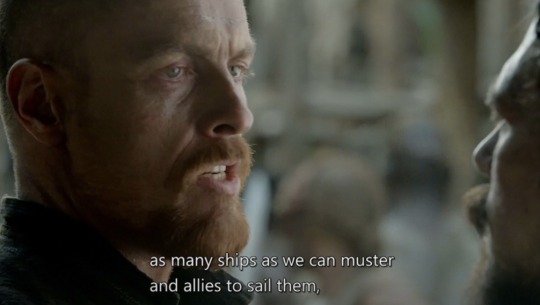

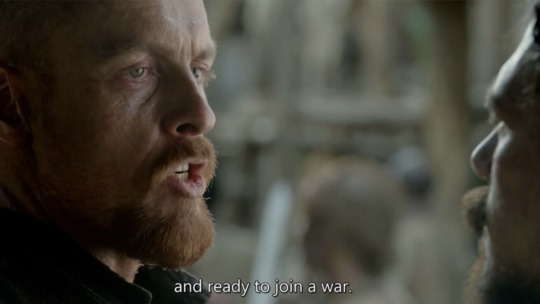
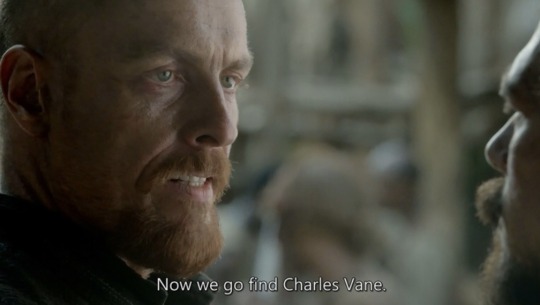
8 notes
·
View notes
Text
Whenever Max in the governor’s mansion/the gold room her outfit seems to always match some element of the rooms, while Eleanor always stands out color wise.
With that room/mansion representing the peace of civilization, I feel like this could mean a couple things. First the effort Max vs Eleanor need to put into being in that room. Or it foreshadows the eventual fates of the two women. Max does find that peace but Eleanor eventually gets killed by civilization.
#black sails lb#3x07#black sails#most importantly it means Max looks incredible in every scene she’s in#I don’t much care for Eleanor’s sellout outfits#idk what they did but Eleanor looks worse once she sides with Rogers#this happens in#3x06#3x05#3x10
4 notes
·
View notes
Text
A Fight Taken To Heart: How Edward Teach Became a Queer Ally in Honor of Charles Vane
This piece was originally written for the fantastic @blacksailszine, which unfathomably came out over a year ago (and you should check it out if you haven't!). Somehow, I managed to procrastinate posting this here for that long, which is asinine. Especially because I'm actually very proud of it!!!
The news about Ray Stevenson today has me emotional (of course) and thinking again about how his performance as Blackbeard had a great impact on me. In his honor, it feels like a fitting day to finally share my tribute to his character on this blog.
Without further ado... please enjoy my meta below 🖤
--------------
The first time we see Edward Teach’s eyes, they’re framed in a mirror with a heart carved above it. Within the context of a scene designed to convey that Teach is a figure who commands fear and respect, this seems to be a curious choice for an introductory shot. Yet, much like many details placed throughout Black Sails’ meticulous narrative, the mirror’s design is poetic in hindsight because Teach’s heart was his ultimate motivation.
Over the course of multiple scenes, the first half of season 3 introduces us to both the pillars of who Teach is as a character and the primary characteristics of his relationship with Charles Vane. Taken as a whole, the picture painted of Teach’s presence in the story is that he acts as a metaphor for heterosexuality, toxic masculinity, and tradition. We learn that Teach had nine wives over the course of eight years, at least partially because he is motivated by the desire for a son. He glorifies strength above weakness, and he defines strength as superior physicality, independence, and sufficient leadership. He reminisces about the original state of Nassau in his youth, in which the standard was an enforced masculinity, powered by the notion that “one had to prove his worth.” And as he says to Vane and Jack in 3x02, in his view,
“You have taken away the one thing that made Nassau what it was. You have given her prosperity. Strife is good. Strife makes a man strong.”
Upon his introduction, Teach sees only the small picture of Nassau, not its place in the bigger picture of the world. He looks upon a Nassau rich in monetary plunder, preparing to come to its own defense or go to war, and he sees the ease in which men can typically join any crew as a marker of a lack of conflict. What he fails to take into account is that the primary strife now originates externally rather than internally because it is the strife of oppression, and that the solidarity that results from that strife creates its own version of strength.
”Why are you so determined to defend Nassau?” he asks Vane in 3x02, because the island is no longer anything special to him. “A lion keeps no den,” he tells Vane in 3x05, “Because the savanna, all the space within it. . . belongs to him.” Teach is not beholden to Nassau for haven or home, because he was able to assimilate into civilization whenever he had cause or desire. He married multiple women, flew under the British flag, and even spoke their “language” of flag codes (3x10). While Teach is certainly a pirate, it is by choice rather than survival.
As a result, he cannot understand the importance of true solidarity amongst the oppressed–and thus, Nassau’s defense–because he’s never needed it, as a straight white man who’s never been limited by oppression. And because this is a narrative where piracy is arguably a metaphor for queerness, filled with characters who do not have the luxury or desire to play by civilization’s rules, Teach sticks out upon his entrance. It’s also partially why he’s initially framed in an antagonistic light; he is not “with them,” and therefore, he is “against them” by default in some capacity.
The exception, of course, is his bond with Vane. Teach is one of many characters motivated by the desire to leave a legacy; as he says in 3x03, “There is an instinct to leave behind something made in one’s own image.” In his case, this manifests as his desire for a son–but he saw parenthood as an opportunity to mold and form another man to be his reflection. Teach wanted Vane to be a copy of him, but Vane never was, and it’s the primary source of the conflicts between them.
Teach had no love lost for Nassau, and so he calls it a “burden” on Vane, while Vane insists that he is “committed to it” and Jack by extension (3x03). Teach scoffs at the idea of such loyalty, deriding and discounting Vane and Jack’s relationship, casting aspersions on Jack’s character in the process–even as Teach demands to receive such loyalty from Vane himself. It’s evident that Teach doesn’t understand core aspects of Vane’s personality and motivations, but Vane is unequipped to explain himself to him.
This is partially because Vane initially doesn’t understand his own motivations either, especially in the face of his father figure’s disapproval. His inner struggle is exemplified in how he’s torn between allegiance to Teach, or allegiance to the rebellion for Nassau’s independence and his people caught in the fight. Flint summarizes Vane’s internal conflict by bringing it to light for him in 3x06:
“They took my home. I can’t walk away from that. Can you? Forget me, forget Teach, forget loyalty, compacts, honor, debts, all of it. The only question that matters is this: Who are you?”
It is not insignificant that a gay man says this to Vane. The struggle of finding oneself is inherently queer as a framing device, especially in the context of a narrative where piracy and freedom are pursued by the marginalized. The fact that wrestling with identity is the defining point in Vane’s arc implies that the answer exists beyond the bounds of what others would ascribe to him. Straight people–particularly in regards to Black Sails’ main cast of characters–are not faced with this question.
And various players do try to ascribe an identity to him. Teach tells Vane that he’s a lion, while the Spanish soldier calls Vane a fellow sheep (3x05); Eleanor lists Vane as the antithesis to civilization (3x01) and calls him an “animal” to his face (3x09). Yet even up to his end, though civilization and history would paint him differently, Vane’s motivations were always painfully human. Vane was driven by emotions on a deeper level than most recognized, and by desire for two primary things: freedom and honest loyalty.
Vane felt empathy for the unfree, and he was defined by wanting to avoid living in chains again at all costs–literally or metaphorically. He explicitly compared the fear that slaves face to the wider struggle of the pirates on Nassau (3x01), and the fear they feel as they sit on “Spain’s gold on England’s island,” expecting a retaliatory response. Vane feared subjugation or submission at the hands of any person or power, considering it a fate worse than death; to him, “no measure of comfort [was] worth that price” (3x08). His manifesto was “side with me. . . and we’ll keep our freedom,” and he said he was “[a man] who would die before being another man’s slave again” (2x06), which became his ultimate fate.
Pursuing freedom defined both Vane’s life and death, but it was not an abstract concept. It was freedom to a purpose: freedom from expectation; to make his own choices; to define home as he saw fit; and, crucially, to surround himself with honest people who provided mutual loyalty and respect without subterfuge or manipulation. This is why Jack, who knew him best and cared for him most, called Vane a “good man” and summarized him this way in 4x07:
“He was the bravest man I ever knew. Not without fear, just unwilling to let it diminish him. And loyal to a fault. And in a world where honesty is so regularly and casually disregarded…”
Vane exhibited and sought both honesty and loyalty. It was also how he expressed his love, and the way he wanted love to be expressed to him in return. That is partially why Eleanor so effectively acted as his downfall: he repeatedly trusted her, but she could not or would not be loyal to him. By contrast, as he told Teach in 3x02, Vane found loyalty and commitment in Jack–and in Anne by extension.
So while “a lion keeps no den,” as Teach said, what a lion does keep is a pride. A lion may be free to roam, but it does so with a family. Teach did not begin to understand the significance of that to Vane until after Vane gave his life not only in the name of freedom, but also in defense of his family and home.
This turns Teach’s earlier question of “Why are you determined to defend Nassau?” into the unspoken question of Why did Charles Vane willingly die to defend Nassau and those who are fighting for it?
When Teach called Nassau–and, to some extent, Vane’s partnership with Jack–a “burden,” Vane tried to explain to him that wasn’t the case. At the time, Teach didn’t listen. He gave Vane an ultimatum: I’ll help protect these people, but you have to leave them, their cause, and your “commitment” behind.
Teach thought leaving all of that behind was freedom, and it was a definition of freedom he thought that he and Vane shared, referring to the two of them as being “of the same mind” (3x05). But Vane was unable to leave his people or their fight behind, because that’s not what freedom meant to him. For Teach, freedom meant solitary independence; for Vane, freedom came to mean solidarity (3x09):
“Because they know that my voice, a voice that refuses to be enslaved, once lived in you. And may yet still. They brought me here today to show you death and use it to frighten you into ignoring that voice. But know this. We are many. They are few. To fear death is a choice. And they can't hang us all.”
After Vane’s death, Teach listens. In the absence of being able to listen to Vane directly, he does the next best thing: he goes to the people Vane valued most and died to protect. In the name of the mutual interest of revenge, he listens to Vane’s family.
At first, Teach obviously thinks Jack and Anne are both weird–to use a different word, he thinks they’re both queer–and he makes that clear in underhanded comments. Neither Jack nor Anne fit into the boxes of “man” or “woman” in the traditional senses that Teach is most accustomed to valuing. He doesn’t understand why Vane would align with them and their cause above all else, or why Vane would be loyal to them and value their unconditional loyalty in return. But Teach seemingly knows that if he can get to know them, then perhaps he can understand what Vane saw in them, and–in turn–learn more about Vane as well. Vane lives on in pieces of them, and so it is upon listening to them that Teach ends up indirectly listening to Vane one last time.
In a discussion spurred by Anne’s concerns, Jack and Teach debate the merits of murdering Eleanor Guthrie or chasing Woodes Rogers, and they bond over their shared understanding and memory of Vane’s “distrust of sentimentality” (4x02). They can chase an empty version of revenge in the name of justice, fueled by emotion... or they can fight to win the war of resistance that Vane gave his life to incite. Between the two of them and their shared grief, and in an echo of Vane’s internalized arc, they find that the only question that matters is this: Who was Vane, and what mattered to him most? They both discover they already know the answer.
For Teach, acknowledging that answer involves fully accepting that Jack and Anne were the family that Vane chose, that the rebellion for Nassau’s freedom was personal enough to Vane that he died for it, and that this is a fight which holds value and necessity that Teach initially misunderstood.
Teach is straight, and his views on masculinity are not fully incompatible with the ones civilization enforces. Oppressive powers hold no true threat for him, because he is capable of assimilation; he could leave Nassau and thus the rebellion for its freedom behind. He always planned to. But after the sacrifice of the man he considered a son, he chooses to become an ally in the fight against white supremacy, and an explicit supporter of Jack and Anne–the queer found family that Vane prioritized, and died to protect.
Teach always thought he was molding Vane into his own image, but the reverse became oddly true instead: Teach allies with the cause, gives his life for it, and indirectly protects Jack and Anne with his final moments, echoing and honoring Vane’s sacrifice.
Woodes Rogers expected to keelhaul Teach into submission by default, through torture no man should have been able to repeatedly survive. But to fear death–to submit to death on anything other than one’s own terms–is a choice. A pirate’s fear is an opponent’s victory; Vane and Teach both knew that, and embodied it. Teach’s unwillingness to let fear diminish him or to be broken by Rogers was largely the result of his own principles and hard-won defiance, but it was also the only reason Jack and Anne narrowly avoided the same fate.
It aligns poetically: in the final months of his life, Teach’s actions were motivated by old shifting shrapnel lodged in his chest and the beating of his heart, which he referred to as “a grim little timepiece” (3x06). And “the louder that clock [ticked]”–the more the shrapnel moved, and the closer his end became–the more inclined he was to pursue happiness and purpose (3x01).
Ultimately, he was keelhauled 3 times, and then he was shot.
For Charles–tick.
For Jack–tick.
For Anne–tick.
And for Nassau–
Boom.
How fitting.
After all, Edward Teach always expected that his heart would bring about his end.
--------------
If you'd like to read more of my meta about this show, here are the other pieces I've written:
• Black Sails, Queer Representation, and the Valid Canonicity of Subtext
(I should crosspost that to tumblr at some point ^)
• The Flinthamilton Reunion Is Definitely Real
• James Flint Is Gay
And my pinned post on Twitter @/gaypiracy has a collection of the shorter posts / writing I inadvisably did on there.
Don't forget to check out the Black Sails Zine for a variety of incredible work :)
#black sails meta#edward teach#blackbeard#charles vane#black sails#edward teach meta#this is mostly going to get seen and scrolled past by people who are into that Other Show now isn't it? probably lol#vanerackham#what on earth is the trio's quasi ship name?#vanerackhambonny#fuck it I don't know#charles vane meta#my meta#okay I'm done. but in all seriousness I'm still very proud of this piece of writing!!!!#thank you to Ray Stevenson for all that he gave us by playing Teach with such gravitas and depth. RIP to a wonderfully talented man
119 notes
·
View notes
Text

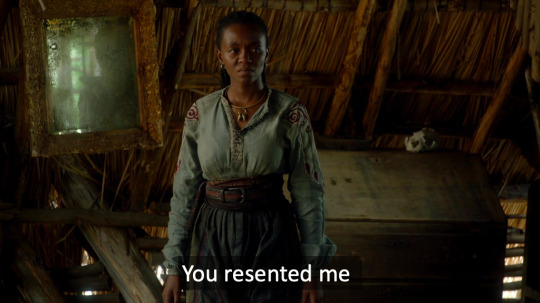
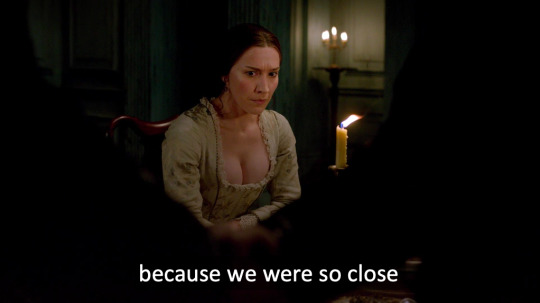
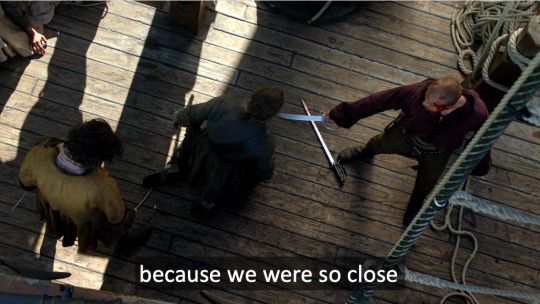
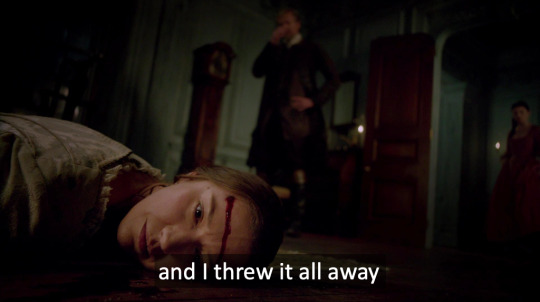
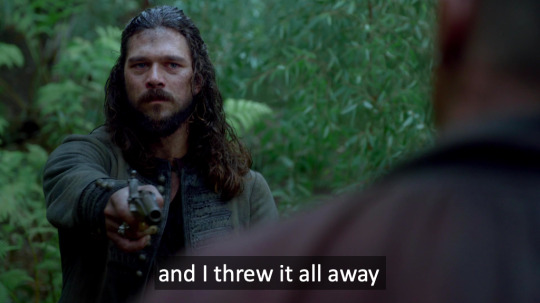
2x09//3x03//4x10
Quote is from ghost!Miranda in 3x05
[Image ID: 6 photos from Black Sails overlain with text. The left column shows Miranda on the deck of the Walrus covered in blood with a bullet wound in her head and Flint's hand pointing a gun at her, Peter and Flint shaking hands with Miranda looking on, and Miranda lying dead on the floor with a bullet wound and Peter and Abigail in the background. The right column shows Madi looking angry in her room in the maroon camp, Flint and Jack holding a defeated Woodes Rogers at sword point, and Silver pointing a gun at Flint. Text on both columns reads, "You resented me because we were so close and I threw it all away." end ID]
Images from https://fancaps.net/
#also the upgrade from being so close to victory being flint and peter shaking hands reconciling with the empire#vs flint holding a sword to empire#black sails#miranda barlow#john silver#james flint#blood tw#death tw#guns tw#sam speaks
64 notes
·
View notes
Photo


Black Sails XXIII
I'm going to admit something to you.
Please don't take this the wrong way...
but I didn't think there was a chance in hell that was actually going to work.
Me neither.
#oh my loves#john silver#james flint#captain flint#black sails#XXIII#3.5#blacksailsedit#black sails xxiii#bs xxiii#black sails 3x05#bs 3x05#black sails 3.05#bs 3.05#sabsmade#mine
68 notes
·
View notes
Photo
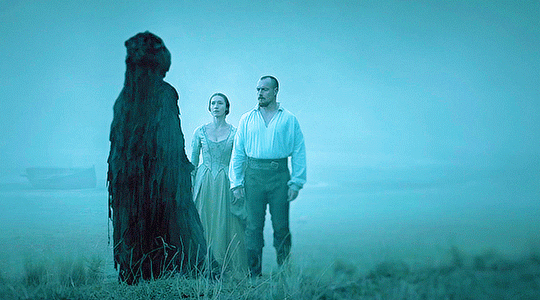


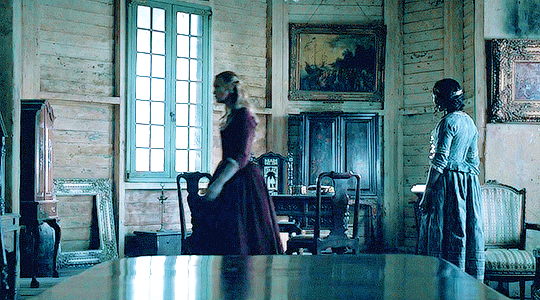
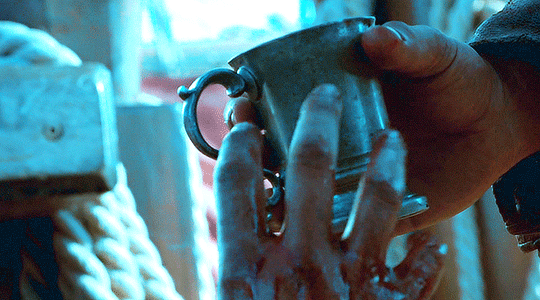

it’s awful, isn’t it? how money makes sheep of us all.
#black sails#bsedit#blacksailsedit#dailyblacksails#black sails 3x05#i always use flint's speech and i wanted to change quote#and that's from the one (1) cameo char who actually spoke spanish hgjfdk#'como el dinero nos convierte a todos en ovejas'!!!!#blood cw#my stuff#my gifs#my edits
279 notes
·
View notes
Photo
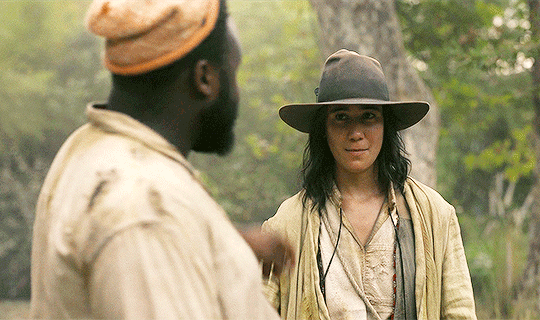
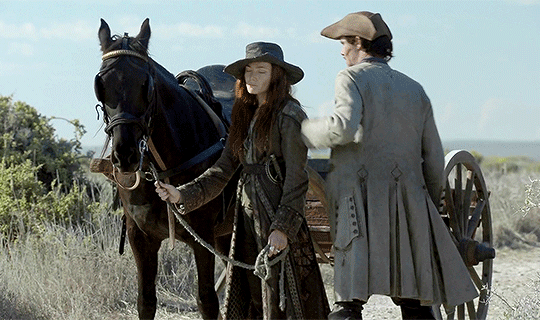
Our Flag Means Death // Black Sails
requested by anon
#our flag means death#ofmdedit#ofmd#ofmd jim#ofmd oluwande#anne bonny#jack rackham#blacksailsedit#black sails#vcreations#vgifs#excuse to rewatch bits of 3x05..thank you...for opening that door#over1000#2k
2K notes
·
View notes
Text
“In the winter, the sun drives hard through those windows. You'll be blinded there lest you keep them shuttered all day long. I had the desk where it was for a reason, though I suppose you haven't been here long enough to know how to sit in that chair.” (3x05)
On the surface, Eleanor’s first observation upon stepping into her old office that Max has taken over might just seem like a petty gripe but, on a symbolic level, it contains a lot of information about Eleanor and Max’s arcs and the way they relate to each other.
When Max inherited the tavern office, she moved the desk. We don’t know exactly why, but we may assume that it was done simply for the sake of being different from Eleanor, paralleling her goal of avoiding Eleanor’s mistakes by wielding her power in a less destructive manner.
However, upon her return, Eleanor informs Max that the desk was where it was for a practical reason. Though its old location may have seemed arbitrary and easily-changeable to Max, someone new to the office, Eleanor knows from experience that this is not the case. And, as it happens, Max doesn’t ultimately find it as easy to avoid Eleanor’s mistakes as she thought she would, betraying Anne to protect her position of power just a few episodes later like Eleanor did to her at the beginning of the show.
Max doesn’t realize it yet as she defensively shoots back “I do not imagine you came to decorate,” but the “awful compromises” that wielding power demands cannot be opted out of, no matter how good your intentions are when you start out. You can’t just move the desk and expect the sun to change its patterns for you.
#black sails#istg in 1x02 when Vane said ‘Be careful Eleanor’ and Eleanor replied ‘Fuck you Charles’ they damaged the very Foundation of the room#so that only variations on that exchange could ever be held in the tavern office again#which is to say that - as angry as Eleanor is with Max in 3x05 and as undeniably rude as she’s being - i can’t not hear this as#a legitimate warning#‘I lost *everything*. Remember that when you sit in that chair.’#and DOES Max? ultimately?#i sometimes wonder if she ever went through with burning That Fucking Chair when she returned to Nassau at the end of the show#even if she did - the act would truly be 100% symbolic since she continued to be ‘the true power in Nassau’ from the tavern office#she’s still Sitting In The Chair even if it’s technically a different chair… that’s just Moving The Desk 2.0#because at the end of the day - reconciling with England while retaining some degree of autonomy and secretly wielding power over Nassau#while a man takes the governor’s seat for appearance’s sake is…#EXACTLY what Eleanor was planning to do before her arrest at the end of s2#so what’s the real difference between that and what we get in the end?#one word: Aesthetics.#and ultimately—as stable as her position might seem at the end of 4x10–nothing is truly insulating Max from#‘losing everything’ just as Eleanor did#say… via the arrival of a certain English governor perhaps…?#:/
126 notes
·
View notes
Photo




compiling all the least tonally indicative netflix descriptions i can find
#(the first three being actually horrific episodes of their respective series)#tbh paradise even trumps the o'brien gets locked in a mind prison thing for me in terms of just visceral squick#also in order series are ds9 / bojack horseman / peaky blinders / black sails#and the actual episode numbers are 2x15; 2x11; & 3x05#sadly i was out of the country at the time of black sails screenshot so for u.s. followers you can't actually get it here (w/o a vpn)#carol overreacts to tv#carol overreacts to life
6 notes
·
View notes
Text
ALIK SAKHAROV WAS THE DIRECTOR OF PHOTOGRAPHY ON GAME OF THRONES??????

(for those of u who don't know who i'm talking about, he directed the following black sails episodes: 2x05, 2x07, 3x01, 3x05, 3x10, 4x02, 4x05)
#insane.#black sails#also yeah i’m very bored so i decided to rewatch got lmfao#it’s still s1 so it’s not that bad. yet
16 notes
·
View notes
Text


5 notes
·
View notes
Photo


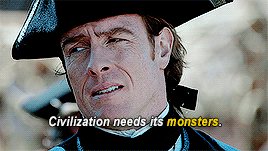

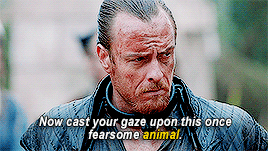
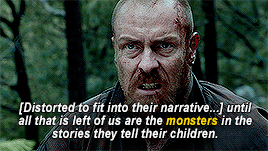



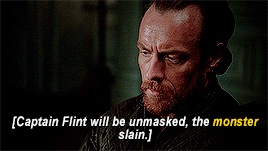
James Flint + Being a Monster.
#james flint#blacksailsedit#black sails#bsedit#gifsi#below 100#obv. not everything is 'monster' but man u might as well replace it with it#like i love/hate that is his narrative that he so desperately tries to escape throughout the show but it constantly follows him#1x01#1x07#2x01#2x04#2x09#2x10#3x01#3x05#4x10
416 notes
·
View notes
Photo

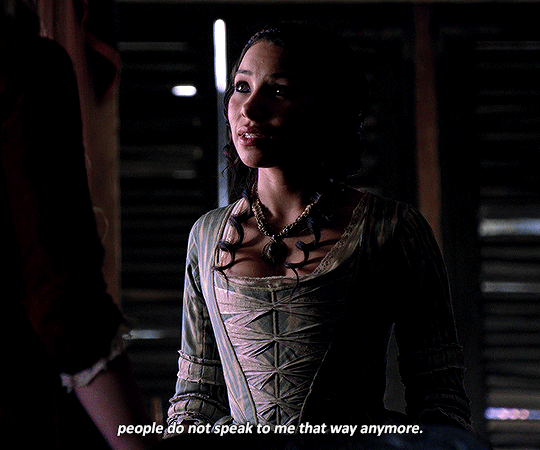
black sails ladies meme // favorite quote(s)
#perioddramaedit#blacksailsedit#bsladies#bsmax#Black Sails#Max#3x05 XXIII.#my GIFs#mine: bs#bsladiesmeme*
1K notes
·
View notes
Text


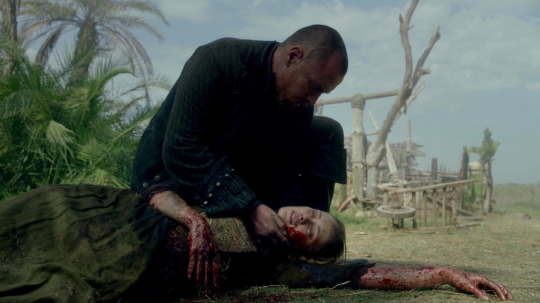

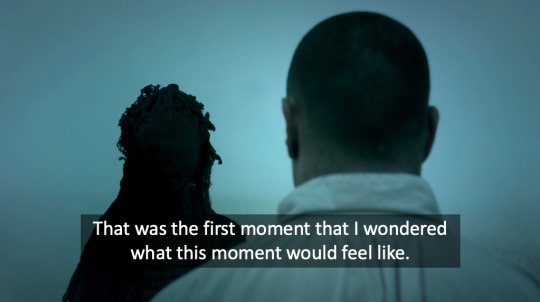
You know how in the Starz 3x05 behind the scenes video, Jonathan Steinberg says that Flint's conception of Death looks like the one in the pirate skit even though he wasn't in that scene because he's seen this show before? Yeah
[Image ID: 5 images from Black Sails. Image 1: Flint and Miranda in a foggy dreamscape facing a tall veiled figure all in black. Text on it reads, "I remember seeing the first flies set on her eyes. How strange it was that they looked so alive and yet did not move." Image 2: Max, Mr. Scott, and various pirates watching a skit in the tavern as a black-painted and veiled figure kisses a pirate dressed as Eleanor. Image 3: Flint holding Eleanor, who is lying on the ground covered in blood. Image 4: Close-up on dead Eleanor's face, crusted with blood and with a fly on her mouth. Image 5: Flint from the back as he faces the black veiled figure. Text reads, "That was the first moment that I wondered what this moment would feel like." end ID]
Images from https://fancaps.net/
#to be fair I can't tell if he's saying that flint's seen the skit before or seen Black Sails before#I was interpreting it as the latter because well#It's done. Wouldn't you agree?#and all that#it would be fitting#black sails#james flint#eleanor guthrie#blood tw#death tw#bugs tw#sam speaks
83 notes
·
View notes
Photo


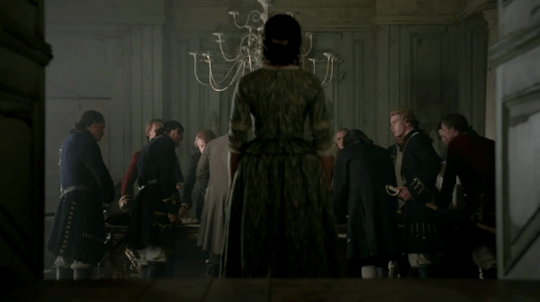
Black Sails XXIII
My lord.
I think you know who I am.
May we have a word in private, please?
#max my love#the queen no one deserved#just radiating power#bs max#black sails#XXIII#3.5#blacksailsedit#black sails xxiii#bs xxiii#black sails 3x05#bs 3x05#black sails 3.05#bs 3.05#sabsmade#mine
50 notes
·
View notes